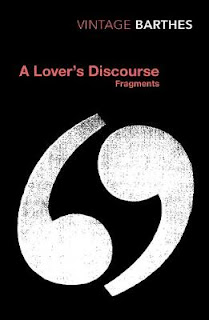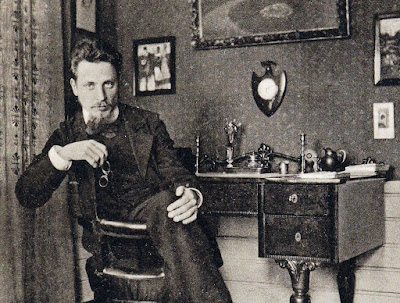Title: A Lover's Discourse
Author: Roland Barthes
Publisher: Vintage
Date of Publication: 1977
Number of Pages: 234
See it on Goodreads: A Lover's Discourse
See it on Goodreads: A Lover's Discourse
Summary
The language we use when we are in love is not a language we speak, for it is addressed to ourselves and to our imaginary beloved. It is a language of solitude, of mythology, of what Barthes calls an 'image repertoire'.
This book revives - beyond the psychological or clinical enterprises which have characterised such researches in our culture - the notion of the amorous subject. It will be enjoyed and understood by two groups of readers: those who have been in love (or think they have, which is the same thing), and those who have never been in love (or think they have not, which is the same thing). This book might be considered, in its restless search for authorities and examples, which range from Nietzsche to Zen, from Ruysbroek to Debussy, an encyclopaedia of that affirmative discourse which is the lover's.
Review
A Lover's Discourse is a book that I recently read and I have to say that it was a stimulating read. Before I go into details though, I will tell you of how I became aware of its existence. As I was browsing my social media (I know, I know) I came upon this wonderful quote that described the way that I was feeling at the moment. The quote went like this:
"Am I in love? -- yes, since I am waiting. The other one never waits. Sometimes I want to play the part of the one who doesn't wait; I try to busy myself elsewhere, to arrive late; but I always lose at this game. Whatever I do, I find myself there, with nothing to do, punctual, even ahead of time. The lover's fatal identity is precisely this: I am the one who waits."
However, this quote didn't have a source or anything (surprise!). So, I did the most logical next move - I Googled it. The result was A Lover's Discourse and I instantly decided to pick it up. Now, I had another reason that I wanted to read about love, and a Bathes' essay more specifically.
I might have mentioned in the past that I was writing a novel. I have recently completed it and now I'm in the stage of editing it. Because my style is close to that of Japanese literature, my main character often shows things rather than saying them. For this reason, I needed some stimulants to fill my head with ideas that might produce something that might help me in this endeavour. Now, I can safely say that this book was the ideal stimulant for my case.
A Lover's Discourse (not to be confused with the YA novel The Lover's Dictionary) is a non-fiction book dedicated to the language of a lover. To be more precise, it is an essay on the expressions that a lover uses in his "outbursts of language" to explain his feelings. There are 80 small chapters in this book, each one dedicated to a different expression in the different phases of love. As Barthes underlines in his epilogue, he didn't place the chapters in an order that could potentially be interpreted into a story. However, if you really wanted to place them into a "correct" order to play out a story, you could easily do it.
One thing that surprised me is that I have never thought that a person could put into writing all those different feelings. If you have been in love or had a crush on someone, you know that there is a great variety when it comes to the thoughts and feelings that take over you. Those feelings are not all exactly love or despair, as there are many stages in between. However impossible this might sound, Roland Barthes manages to do it. There were cases, where I had to stop reading because I was thinking of a moment that I felt exactly the same way the author described in that particular chapter.
Having said that, it's time to talk about the language of A Lover's Discourse. This is not an easy read. There were times when I had to reread a certain part to understand its meaning. Furthermore, Roland Barthes uses a lot of references from various sources. However, I was not familiar with all of them. This didn't stop me from enjoying the book, even though I have a feeling that I might understand some parts better if I had an idea of what Barthes was actually talking about. Luckily for me, I had already read The Sorrows of Young Werther, which was heavily referenced in the book. Now, I simply feel that I want to reread Werther under the new light that A Lover's Discourse has given me.
Another trap that I found in this book is that it is very quotable. How is this a trap? I could easily fill my review with quotes from it, without any other context, and you would LOVE it. Yes, it is great. Yes, it might be the book I have underlined the most (perhaps along with De Profundis). Nevertheless, I fear that because it is too quotable I might have stayed on the surface of the subject - at least in some parts.
All in all, A Lover's Discourse was a challenging yet eye-opening book for me. I found it very relevant even though it was published in the '70s, especially now, with all the digital lovers and online dating. Just remember how many times you have been overanalyzing a text you received from your crush. A Lover's Discourse has given me a deeper understanding of this mystery that is love and all of its nuances. And with that, I'm leaving you with one more quote from the book:
"I love the other, not according to his (accountable) qualities, but according to his existence; by a movement one might well call mystical, I love, not what he is, but that he is."
Read more reviews here






